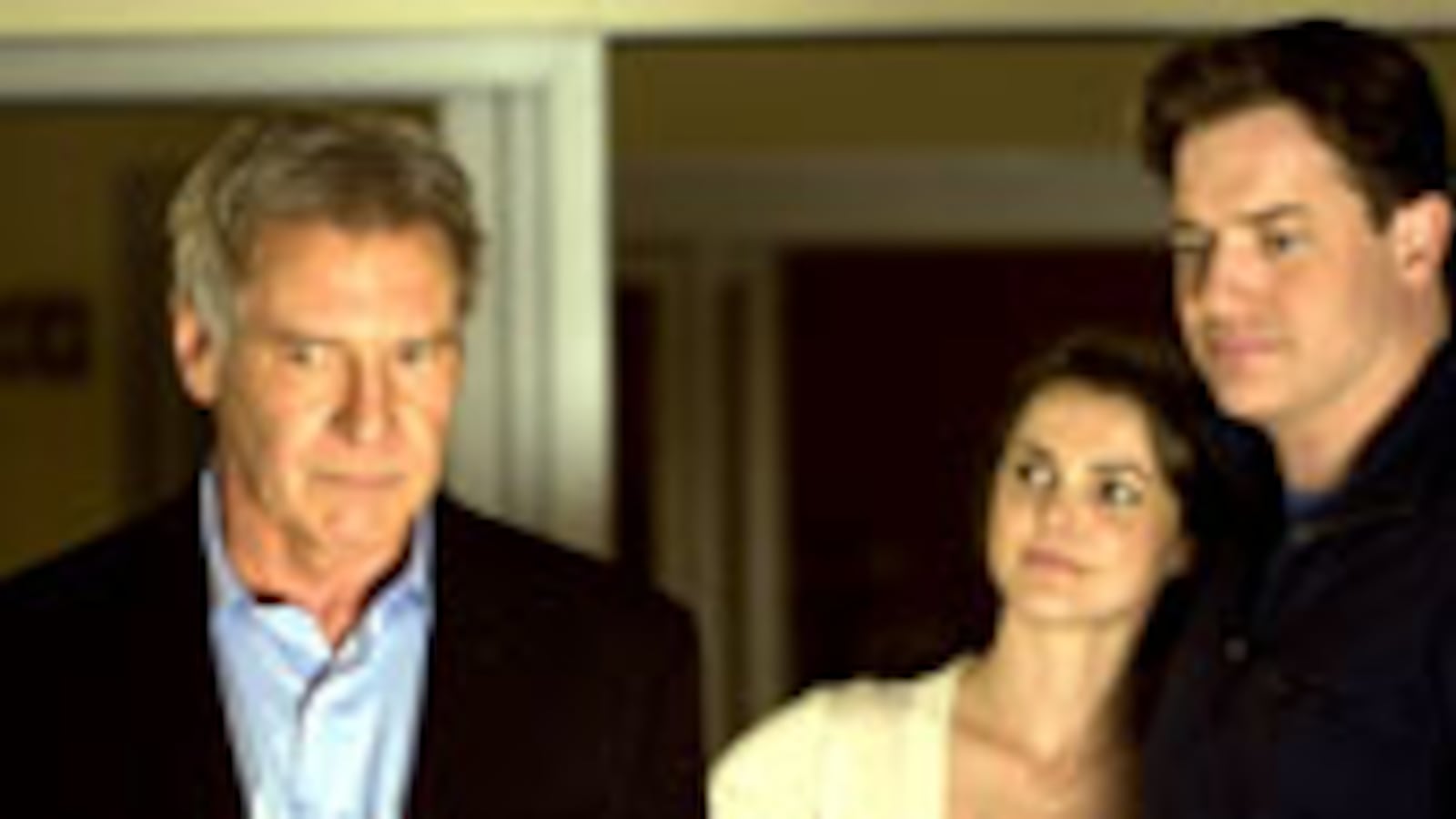
Throughout the ‘80s and ‘90s, Harrison Ford reigned as the unchallenged star of middle-of-the-road cinema. Almost unique in modern history, he not only created two iconic characters—Han Solo and Indiana Jones—but also managed to step away from them, into a hugely successful leading-man career in movies such as Working Girl, Patriot Games, and The Fugitive, to name a few. He excelled in grownup action roles, respectably above the pyrotechnic-driven thrills of Stallone and Schwarzenegger—but he was also able to charm as a romantic lead.
As one-note as Ford’s performances were, audiences seemed never to tire of that note. Until one day, they did.
And then it ended. Almost overnight, Harrison Ford, 67, went from summer-blockbuster stalwart to Mr. January, a star of films unceremoniously unloaded into Hollywood’s dumping-ground month. His new film Extraordinary Measures, which opened Friday, is about to disappear from a theater near you: It is on track to make a mere $7 million this weekend, putting it in seventh place.
What is terrifying about this change is that it happened almost without explanation—like a dust bowl suddenly descending upon a once lush and verdant land. One day there was a giant body of water here, and the next day there wasn’t.
There was no scandal or public meltdown that brought Ford’s career to a halt as happened to Mel Gibson and Tom Cruise. The relatively—by Hollywood standards—private star, had not suffered from overexposure like a Bennifer or Jude Law. His movies didn’t become markedly worse overnight: He continued making the same nuts-and-bolts thrillers and tepid romantic comedies he had always made.
And yet, his career fell off a cliff. What Lies Beneath was the 10th-highest-grossing film of 2000; two years later, the very decent, Kathryn Bigelow-directed K-19 finished at No. 76. And that was followed by Hollywood Homicide: No. 92 for the year in 2003.
Even Ford’s long-awaited return last year to his iconic Raiders role, while performing well at the box office, was more of a fizzle than a homecoming in terms of cultural impact.
The tale of Ford’s decline is perplexing. Can we find lessons here for our own lives? We must try.
Lesson One: If You Hold a Single Note Long Enough, It Will Eventually Go Off Key
What particularly bedevils about the collapse of the Harrison Ford market is that the basic product remained more or less unchanged. Even in Extraordinary Measures, he projects the same intense energy he displayed at his career height, barking “Get out of my lab!”—and then learning to care despite himself.
It’s not as though dramatic range was ever Ford’s thing. Showbiz legend has it that he got the part in Star Wars after volunteering to help out buddy George Lucas at a casting session. Ford listlessly fed lines to the auditioners in his blank, affectless manner, and, at some point during the day, Lucas heard his monotone delivery of “I’ve never heard anything to make me believe there’s one all-powerful Force”, and yelled, ‘That’s my Han Solo!’
Once that deadpan style was forged, Ford stuck with it. Such consistency may not have been the road to Oscar trophies, but finding one character to play served Ford well for years, as it had John Wayne, Cary Grant, and Jimmy Stewart before him.
As one-note as Ford’s performances were, audiences seemed never to tire of that note. Until one day, they did. Baby-faced boy/men like Johnny Depp, Leonardo DiCaprio, and Robert Downey Jr. suddenly became America’s action leads, and guys in suits suddenly looked like grandpa trying to crash the kids’ party.
Lesson Two: Make Sure the Story Is Always Yours; AKA, Never Let Your Costar’s Narrative Overwhelm Your Own
The beginning of the end for Ford was a little comedy adventure entitled Six Days, Seven Nights, in which he starred opposite Anne Heche as a pilot marooned on an island with a high-strung magazine editor. When it came out in 1998, Six Days wasn’t Ford’s worst film by a long shot (let us award that distinction to the criminally mawkish Regarding Henry). However, it was the victim, through no fault of Ford’s, of terrible timing.
When the film was released, co-star Heche was in the midst of her dramatic, well-publicized, tabloid-fodder relationship with Ellen DeGeneres. As one of the first (then) openly gay actresses to star in a Hollywood feature film, Heche-as-heterosexual-lead opposite Ford produced a heavy wave of predictably juvenile guffaws in public commentary on the film. While these snickers didn’t sink the film at the box office—it actually performed respectably—their lack of onscreen chemistry was mocked as ridiculous.
Ford had been sleepwalking through tepid Hollywood concoctions like Regarding Henry and Sabrina for years before Six Days. But after that moment, audiences have refused to consider him as a romantic lead again. His next film, Random Hearts, was dead on arrival, earning a mere $31 million. He has had two hits since Six Days—the haunted-house thriller What Lies Beneath, which didn’t even feature Ford’s face on the poster, and his return to Indiana Jones.
Lesson Three: You Can’t Go Home Again
Is there anything sadder than throwing up your hands on the idea of moving forward and instead capitulating to other people’s desires? Yes, there is: when giving people what they want still doesn’t work.
The world had been buzzing for two decades about when Ford would once again don the whip and felt hat to play Indiana Jones. But when he finally did in 2008’s Indiana Jones and the Kingdom of the Crystal Skull, the reaction was OK at best. At worst, he was torn apart in a well-circulated Internet parody and on a fantastically outrageous South Park episode.
The film performed well at the box office, but the excitement of the buildup fizzled almost immediately. In the end, the film’s major legacy may be that no one is crying for another Indiana Jones movie anymore.
Conclusion:
Business seminars could use the Ford implosion as a case study to show the need to remain agile and change with the times. And it is possible that when the actor passes out of this period, he could have an On Golden Pond moment, and, like Henry Fonda was then, be rewarded for his longevity. His fans yearn for that next phase to come. Because in the end, when Hollywood Homicide has long been forgotten, Han Solo and Indiana Jones will live on, along with Blade Runner and The Fugitive. He leaves us with the Harrison Ford we once loved moderately intact. Which these days in a celebrity, is far more than we’ve come to expect.
Richard Rushfield is a four-year veteran of the American Idol beat and the author of a recent memoir, Don't Follow Me, I'm Lost.





